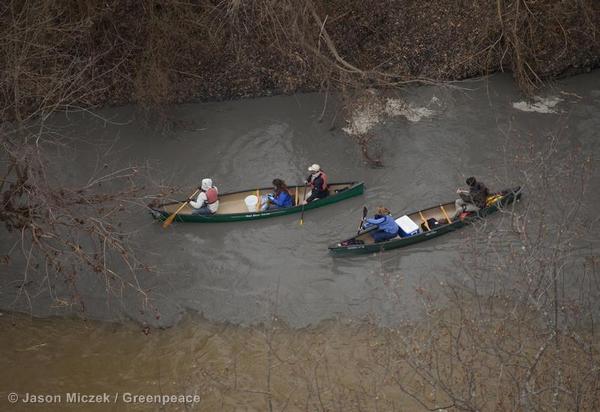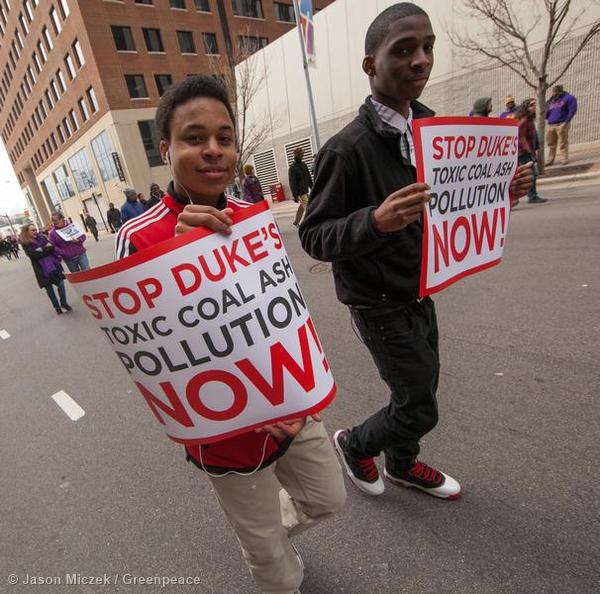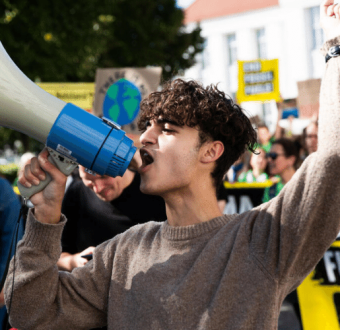Its been one year since Duke Energys Dan River power plant caused one of the worst coal ash disasters in U.S. history, spewing up to 39,000 tons of toxic coal ash across North Carolina and into Virginia. So where do things stand now?
More than 90% of the coal ash still remains at the bottom of the Dan River, the majority of Dukes 33 coal ash dumps in North Carolina are set to stay in place, and state residents stand to foot Dukes bill for what few dumps the company does properly clean up.
People in canoes maneuver in the Dan River where a coal ash spill discolored the river in Eden.
Its hard to see why such a disaster should result in so little progress. Fortunately, the solutions are clear: 1) remove the corrupting influence of corporations like Duke from the political process, including by reversing Citizens United; 2) create and protect policies that allow clean, renewable energy to continue its rise against dangerous fossil fuel power.
They are solutions that politicians, businesses and everyday residents are already campaigning for.
Containing corporate power
The Dan River spill is a case study in corporate influence. Start with North Carolinas governor, Pat McCrory. The governor is a former employee of Duke of 28 years, has received more campaign money from Duke than any sitting governor, and, until the spill, likely held $10,000 worth of company stock.
No wonder then that McCrory installed John Skvarla as head of the states Department of Environment and Natural Resources (DENR). At an agency created for environmental protection, Skvarla quickly set about a pro-business agenda for companies like Duke. Following the spill, officials at DENR were subpoenaed as part of a federal criminal investigation into the agencys ties to the company.
Dukes political ties surfaced again in the North Carolina General Assembly, where, unsurprisingly, the legislators who benefited from Dukes campaign contributions forwarded a bill that practically forgave the company for its coal ash problem. Leading the list was then-Speaker of the House Thom Tillis (Tillis is now a U.S. Senator for North Carolina).
The corrupting influence of corporations has certainly not been helped by Citizens United, the 2010 Supreme Court decision that approved unlimited election spending by corporations. Unsurprisingly, Dukes political fundraising through its PAC has made a notable spike since 2010.
The good news? Politicians, businesses, and everyday people are already campaigning to reign in corporate power, putting public issues back into the publics hands.
For the last two summers in North Carolina, environmental, civil, labor and other progressive groups (including Greenpeace) have gained national attention for their Moral Mondays rallies at the state capitol, putting the spotlight on voter suppression and other regressive legislation at the hands of corporate-sponsored politicians.
At the national level, theres the Democracy Initiative, a coalition of similar groups (Greepeace included) campaigning to overturn Citizens United, end voter suppression laws across states, and reform Congressional filibuster procedures so important legislation can move forward. Groups involved with the Initiative have already gathered 5 million signatures under a petition to Congress, demanding an amendment to overturn Citizens United.
Making way for solars rise
All that work plays into the second solution to disasters like Dan River: renewable energy.
To be sure, no solar panel or windmill has ever caused a spill. And they dont come with the energy costs that coal or gas power does. North Carolina clearly has the potential to build solar, ranking fourth in the nation in installed capacity. Nationally, there are already more workers in solar than there are coal miners.
A rooftop installation through Solarize Charlotte, a grassroots initiative to help make the transition to solar power as easyas possible for Charlotte residents.
By reversing such problems as Citizens United, it will be much easier to maintain the key policies needed for renewable energy to continue its rise. Start with net-metering. The policy compensates homeowners and businesses for any extra power their rooftop solar panels contribute back to the grid.
The policy has proven a major boon to solar in North Carolina, and should be upheld in the face of any attacks, including by NCUC, the states public utilities commission. (The chairman of NCUC is Ed Finley, who similar to DENR head John Skvarla, was re-appointed by former Duke employee Gov. McCrory. Finley, like DENR, also shares the honor of being subpoenaed following the Dan River spill.) Residents in Indiana–even Tea Party members–are already rallying to fend off legislative attacks on net-metering there.
The Dan River coal ash spill should have never happened. Its handling was a disaster within itself. But with known solutions, and people power, we can not only avoid another Dan River, but lay the path for a clean energy future that all residents can enjoy.






